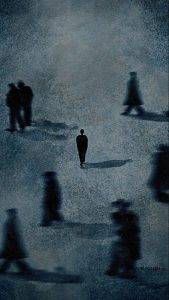My story is inspired by my memories of family holidays in southern Italy. […] Furthermore, The Countries of Solitude was partly inspired by Gabriel Garcia Marquez’s monumental novel One Hundred Years of Solitude.
The countries of Solitude *I Paesi della Solitudine*
I’m continuing to translate a novel utterly new to the literary scene.
We are in the 80s.
This is the story of a Calabrian village in southern Italy where the whole community is involved in every crime and where some have unique talents. One of them is eleven-year-old Gebedia.
One of his friends has been abused; his father inflicted all kinds of suffering on his son, such as extinguishing burning cigarette butts on his little child’s body.
Gebedia also loves Sofia, who is the same age. But Sofia has to leave to go to the north.
The boy has an idea. He will build a bicycle and run away from home to find his lost love.
While Gebedia crosses Italy, his small country village is the victim of heinous crimes that his father, Michele, must solve before the whole community turns against the system. But Gebedia’s journey is linked in a double-edged way to the harsh and drastic events in his village, Vitrusi, and in some way, he, too, will become one of the crucial cogs in saving his people from divine judgement.
My story is inspired by my memories of family holidays in southern Italy. I didn’t create any characters based on myself; I only brought my experience and knowledge of Italian culture into the story. Furthermore, The Countries of Solitude was partly inspired by Gabriel Garcia Marquez’s monumental novel One Hundred Years of Solitude. Below, for you, is a piece of the translation I’m working on.
The Countries of Solitude
Gebedia simply walks. He snuck out of the house before his mother forced him to go to mass, which he doesn’t feel like doing today. Soon, the streets are filled with people in procession, women with their handbags clutched at their sides and men with hats chewing liquorice or smoking. The elderly still move well, even those in their eighties. Grandfather used to say that it was the mountain air that worked wonders.
Then, Sofia is on the opposite side. She has not moved, looks straight ahead, motionless, incorporeal, plasticised in her own pallor, a plaster form, a cast filled with stardust. And realising that he cannot close his mouth, because when you come up against beauty, amazement is fulfilling. Even from there, he sees the gentle dunes of her big eyes and that green essence of beryllium imprinted on the white of her sclera.
Gebedia takes delicate steps. He does not want to disturb her in any way. He imagines himself as small as a wad, moving like a strand of straw suspended mid-air. And even when their gazes meet, he has the impression that she sees beyond.
Behind the girl, a broad-faced man with large glasses appears. He calls her.
Sofia. The sound of that name sounds terrific to him.
They go to mass; that man takes her by the hand and leads her away.
‘Damn me,’ Gebedia says, cursing himself for not having indulged his mother that morning.
Even now, as the sun sets, filling the sky with red, while Sofia pinches his side to greet him and then slips into a narrow street, it seems to him that nothing has changed since then—three years ago, as three minutes ago. Only when she departs does it seem impossible to do anything else.
Continue…
Let me know your thoughts in the comment section below; any suggestions would be appreciated.
Marcello


